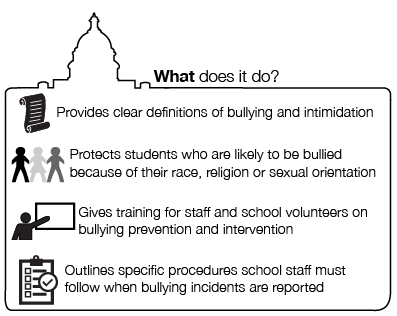New law aims to combat bullying
Policies changing following new anti-bullying law
April 30, 2014
By the time students return to school this fall, the school district will have made several changes outlined by the new anti-bullying legislation.
The Safe and Supportive Schools Act was signed into law April 9. It requires school districts to have an anti-bullying policy, which includes a clear definition of what constitutes bullying.
Schools also need to have effective ways of communicating the policy, as well as having ways of addressing bullying incidents.
The other requirements include having a key person in the building who is responsible for dealing with incidents and having the adults who work with students trained so that they will be able to more effectively respond to bullying.
Sophomore Kris Lynch said she heard about the new legislation through the Gay Straight Alliance at Park and wanted to get involved.
“I’ve had friends who have been bullied a lot, and I just want to make them feel safe,” she said. “I thought I could help try to make a difference by getting people to sign [a petition].”
Freshman Elise Bargman also worked with Lynch on the petition.
Bargman said she was happy to get involved because she understands the need for a new law.
“I’ve started to see what other school districts are like as I hear from more students in other school districts, and it seems to me that the great atmosphere of St. Louis Park schools is the exception and not the norm,” Bargman said.
Superintendent Rob Metz said he thinks the idea of the bill is good, but now the district is going to determine what needs to happen and how to effectively make changes.
“We obviously don’t want anyone to get bullied,” Metz said. “How we’re going to make it work, we haven’t figured that out yet.”
State Sen. Scott Dibble was the main sponsor of the bill. Dibble said he knows the importance of this issue.
“I’ve been aware for a long time, both through personal experience as well as connection to a lot of other people, about the reality of bullying in young people’s lives,” Dibble said.
Dibble also said a major turning point for him was the research being done about the negative effects bullying has on students. He came to the conclusion there are effective ways to respond to bullying, but not enough schools were using those methods.
Dibble said according to surveys done in Minnesota schools, the previous anti-bullying law was ineffective.
“The old anti-bullying law was shown to be a total failure,” Dibble said. “It’s having no effect for the positive in young people’s lives.”
Metz said changes will be made to the schools’ bullying policies over the summer.
“The principals can all come together, and really take our time and go through it, and make sure that we can do everything that we need to do,” Metz said.





